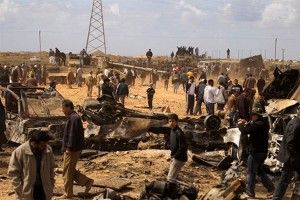Rebels Launch New Offensive
Buoyed by U.S. and allied airstrikes that relieved a siege of Benghazi, Libyan rebels launched an offensive early Monday aimed at retaking the strategic city of Ajdabiya, as Western warplanes continued pounding forces loyal to longtime leader Moammar Gaddafi.
Explosions and plumes of smoke marked the scene of the strikes against Gaddafi’s forces in Ajdabiya, about 100 miles south of the rebels’ de facto capital of Benghazi, and advancing rebels cheered when Western warplanes flew overhead. The rebels by Monday had regained control of Zuwaytinah, an oil terminal about 16 miles northwest of Ajdabiya that had been captured by loyalist forces last week, news agencies reported
Despite the airstrikes, however, Gaddafi’s forces were digging in outside Ajdabiya, which straddles highways that go north to Benghazi and east across the desert to Tobruk.
From a point about five miles from the northern entrance to Ajdabiya, rebels jumped into dozens of vehicles and made a massive push toward the city Monday when they heard jets in the air and the sounds of bombardment. But after about half a mile, the rebels came under fire from loyalist tank and mortar shelling and promptly turned back.
Afterward, rebel commanders said they plan to wait for more allied airstrikes against Gaddafi’s forces before pushing forward again.
But in Stuttgart, Germany, the commander of coalition forces involved in the Libya campaign, U.S. Army Gen. Carter F. Ham, said the allied mission was to “protect civilians from attack by the regime ground forces” and not to provide close air support for the rebels or “support opposition forces if they engage in offensive operations.”
In a news conference with Pentagon reporters by video hookup, Ham, who heads the U.S. Africa Command, also said the allies are not targeting Gaddafi personally or seeking to destroy the Libyan armed forces. He said the opposition consists of civilians who are trying to protect their homes and families, as well as military forces with heavy weapons, and he acknowledged that it might be difficult to distinguish between the two in deciding when civilians are being attacked and thus subject to allied protection.
On Sunday, coalition aircraft — roughly half of them American — flew about 60 sorties, and there have been 70 or 80 sorties Friday, “well over half” by planes from other countries, Ham said. The result has been that Gaddafi’s forces “now possess little will or capability to resume offensive military operations,” he said.
Ham said the aim now is to extend the U.N.-mandated no-fly zone southward and westward from Benghazi to cover other cities, including Misurata and Tripoli. In doing so, he said, “it is likely we will encounter the regime’s mobile air defense systems . . . and will certainly attack them.”
Ham defended an attack on Gaddafi’s compound in Tripoli, saying the large complex included air-defense systems and a command-and-control facility, which was the main target of the strike. The attack degraded “the regime’s ability to control its military forces in the attack on civilians” and thus had a “very direct relationship” with the allies’ mission, he said.
He added: “I have no mission to attack [Gaddafi], and we are not doing so. We are not seeking his whereabouts or anything like that.”
In Benghazi, Libya’s second-largest city, anti-Gaddafi spokesmen said the rebels ultimately still plan to march on Tripoli, the Libyan capital where the 68-year-old strongman remains ensconced. Opposition spokesman Ahmed al-Hasi said the rebels would welcome more airstrikes but want to achieve their aims without the intervention of foreign ground troops, Reuters news agency reported.
New fighting also was reported Monday in the besieged city of Misurata, where rebels have been battling to hold onto their westernmost stronghold, Arabic language television networks said. Rebels claimed that the Gaddafi government was bringing civilians from nearby towns to serve as human shields for his forces laying siege to Misurata, Libya’s third-largest city about 130 miles east of Tripoli.
Gaddafi has threatened the West with a “long, drawn-out war,” but his forces have offered no serious military challenge to the establishment of a no-fly zone over his country.
Click here to read more.


